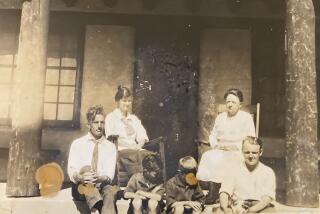Old Flame Flickers Brightest
- Share via
When Edward Jones finally asked Arlene Decker to marry him, she agreed without hesitation. “And I would have more than 50 years ago,” said Decker, “if you’d asked.”
Decker and Jones, both 78, have known each other since childhood, growing up on neighboring farms in Alden, Okla. They were high school sweethearts. He wanted to be a journalist. She wanted to teach.
World War II derailed their dreams. Jones enlisted in the Army Air Force. Decker dropped out of college and went to visit a sister in Sierra Madre.
Before she left, she sat at the square oak table in her family’s farmhouse and wrote her sweetheart a letter. She had no fancy stationery; she used ordinary lined paper. She told him of her plans to travel, saying he could write to her in care of her mother.
In closing, she wrote what, until that moment, she had lacked the courage to say: “Edward Jones, I love you.”
She mailed the letter to Jones’ mother, asking her to pass it along as soon as she got an address for her son. A forgetful woman, Jones’ mother placed the letter on a shelf.
*
As a child, Arlene Walter lived in a two-bedroom farmhouse with her parents, her grandmother and her older brother and sister. Her mother made their clothes. The farm had no electricity or plumbing. At 15, Walter and her best friend, Norma Dean Barton, worked in the cook shack during summer vacation, making stew, cobbler and biscuits for a seven-man threshing crew that went from farm to farm harvesting wheat and oats.
When Jones, who had joined the threshing crew, strode in and sat on a stool, Walter caught her breath. She’d had a crush on him all year.
He had a slender, athletic build and his dark hair had a hint of red. He wore overalls, a blue cotton shirt, a straw cowboy hat and work shoes. He was quiet and respectful. He paused before speaking. He never swore. She always made sure his ice tea glass was filled.
“He was real cute,” she recalled.
It wasn’t long before the rest of the crew was teasing Jones about the young woman who rolled her long dark brown hair into a pompadour and served him enough ice tea for three men.
That summer, they began dating.
Jones would borrow his father’s La Salle with its whitewall tires, fetch Walter, and they’d go off to the movies in Carnegie, a town 15 miles away. The La Salle was long and flashy, and everybody could see it coming. Walter’s brother would provide a running commentary on Jones’ approach as he drove to their house.
Jones was a hard worker, her father thought. Of all the young men in the neighborhood, her father liked Jones best. The teenager played football, baseball and basketball -- and played them well. Jones’ mother and Walter’s mother had known each other for years.
Walter went out with other young men, but if she had a date with someone and Jones asked her out, she’d cancel her plans to be with him. She’d laugh and scold that he was too sure of her feelings for him.
After Jones joined the Army, Walter began dating one of his rivals, a fellow named Jack Rife, who played baseball on an opposing high school team. She was 18. When she told her mother she and Rife were engaged, her mother laughed. Angry, Arlene Walter pointed out that her mother had cried when her sister became engaged.
“That’s because your sister was serious,” her mother replied.
Not long after that, Walter began wearing Rife’s ring. Jones, who hadn’t yet shipped out, asked her out on a Saturday night. Walter accepted, canceling her date with Rife. That evening, Jones paid no attention to the ring on her finger. But when Rife spotted the couple sitting in a car, he demanded his ring back. She gave it to him.
The next morning, Rife asked her to reconsider.
Arlene Walter refused.
“I always knew Edward was the one. He was the only one I ever thought of,” she said. “It was just something about whenever I’d see him. Chemistry. I have no idea. I thought he was the best thing ever, and he must have thought the same about me because he was constantly coming to visit.”
*
‘She Was My Honey’
Jones lived on a farm three miles from the Walters place. His father was stern, no-nonsense. He believed the measure of a man was in how hard he worked. Before school, Edward Jones milked the cows, fed the hogs and calves, fed and harnessed the horses, and turned the crank on the separator that divided the cream from the milk. After school, chores kept him busy until supper.
He was allowed to play sports only when he wasn’t needed on the farm. He often missed practices and games. His father usually would let him borrow the La Salle if he agreed to take along his two younger sisters. Was anything more embarrassing than having the girls tag along?
Jones didn’t notice Walter until he joined the harvest crew. Her attention to him was flattering. Plenty of fellows wanted to ask her out. She stood 5-feet-2. Her hair reached well below her shoulders. Her laugh was infectious and comforting.
For his senior class party, Jones asked his father if he could borrow the car. Sure, his father said, if you take your sister along. But Edward Jones had another companion in mind. He asked Arlene Walter, and she picked him up in her family’s car.
“She was my honey,” Jones recalled.
Then came World War II. If he’d stayed in Oklahoma, Jones figured he would have asked Walter to marry him. But he had friends who had married before shipping overseas, and he didn’t think it made sense.
He was posted to Italy. He manned the nose gun on a B-24 Liberator. He always believed he’d come back home. He was not much of a letter writer. In the three years he was in the military, he rarely wrote to his mother.
He never wrote to Arlene Walter.
*
Agonizing Months
Every night, Arlene Walter prayed for Edward Jones. Their hometown was so tiny that word spread fast when a young man was killed or injured. She knew he was alive. As the months went by, she figured he’d gotten involved with another woman. Or the equally painful possibility that he no longer wanted her.
Three days after Arlene Walter’s arrival in Sierra Madre, her sister left to be with her husband, who was being shipped overseas. Walter knew no one in town. Although she’d only planned on visiting her sister, she decided to stay. She worked in a bakery and fell in love with the baker’s son. When he proposed, she accepted. She became Arlene Decker, and the couple had two children.
Edward Jones returned from the war and called on Walter’s parents. Her father told him she had married. Two years later, Jones fell in love and married. He and his wife also had two children.
*
They Meet Again
Arlene Decker and Edward Jones wouldn’t meet again until 1993, at the 50th anniversary of their high school graduation back in Oklahoma. The high school itself no longer existed. She had come without her husband, who had suffered a stroke years earlier. She sat next to Norma Dean Barton and the old friends caught up on each other’s lives. Barton, who was facing the door, kept interrupting to tell Decker which classmate had just walked in.
There’s Edward, Barton suddenly announced. Decker quickly turned to look. Jones hadn’t changed at all, she thought. He hadn’t gained weight. He looked the same, except that on this night, he wore a suit. She’d seen him in a suit only once before, at high school graduation.
“I still knew I had feelings for him, but nothing was going to happen,” she recalled. “I knew I really liked him, but I was married.”
*
Cold Shoulder
Jones arrived at the reunion without his wife, who was visiting family. Almost immediately, he was miffed. The 12 classmates on hand had greeted him warmly. The women hugged and kissed him. Except for Arlene Decker.
That, he thought, was cold, downright snobbish. She had snubbed him decades ago, he thought, and now she’d done it again.
He sat across from her at the long dinner table. Banter was an easy distraction.
One classmate, always such a runt, had grown into a huge, tall fellow, a millionaire living in a mansion in Denver. Jones enjoyed their company, even more as adults than when they were kids.
At the end of the evening, the group milled about, saying goodbye. Everyone promised to meet again. They’d hold their own reunion every two years, they vowed.
Then Edward Jones felt his anger well up. He looked over at Arlene Decker and finally unburdened himself. “Arlene is a heartbreaker,” he blurted out.
Her face grew hot. How dare he? she thought.
Then she tore into him. “You have no one to blame but yourself,” she said. “You didn’t write to me. You never answered my letter.”
He was baffled. What letter? What on Earth was she talking about?
She was making it up, he thought.
On a hunch, he went home and dug through his mother’s belongings. She had died many years earlier. In a metal box, he came across an unopened envelope. The handwriting was familiar.
It was Arlene Walter’s. She wrote of her love and offered to wait for him. Unless, of course, his feelings for her had changed. Jones showed the letter to his wife. It was, he thought, one of those twists of fate.
*
Suddenly Alone
Jones and Decker saw each other at two more class reunions.
In September 1997, Jones’ wife, a diabetic, slipped into a coma. After 49 years of marriage, she died.
Several months later, he ran into a cousin of Decker’s in Oklahoma and told her, “If Arlene is ever single, I’m going to marry her.”
In March 1998, after 54 years of marriage, Decker’s husband died. Jones called her in Sierra Madre to offer his condolences. He called two more times to chat. Then he called again in early June.
She was standing in her dining room. It was midmorning. After asking how she was doing, he said, I’ve got a question for you.
“Would you marry me?”
Three months later, on Aug. 22, 1998, Arlene Decker and Edward Jones were wed. They now live happily in Decker’s house and visit Oklahoma twice a year.
More to Read
Sign up for Essential California
The most important California stories and recommendations in your inbox every morning.
You may occasionally receive promotional content from the Los Angeles Times.













